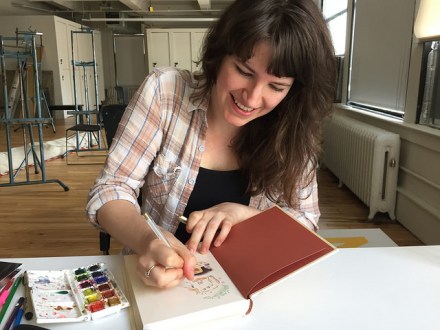Virtual Memories Show 202: Karen Green
Podcast: Play in new window | Download
Subscribe: Spotify | TuneIn | RSS | More
“My plan is to make this a research destination for comics studies, especially as they relate to comics in New York City.”
Karen Green, Curator of the Comics and Cartoons collection at Columbia University, joins the show to talk about her secret origin! How did she go from bartender to medieval scholar to comics librarian? We get into the evolution of the library and comics scholarship, her proudest acquisitions, her love of NYC and being a bartender there in the ’80s, reading Playboy for the cartoons, the experience of having a portrait done by Drew Friedman, her Venn diagram with Mimi Pond, and the one cartoonist she’s still speechless around. Give it a listen! And go buy Drew Friedman’s More Heroes Of The Comics: Portraits Of The Legends Of Comic Books; Karen wrote the intro!
“Things that were throwaway materials for the medieval or early modern period are now priceless artifacts in museums and libraries around the world. Who’s to say that the things we see as disposable culture today are not going to be given the same valence?”
Enjoy the conversation! Then check out the archives for more great episodes!
Lots of ways to follow The Virtual Memories Show! iTunes, Twitter, Instagram, Soundcloud, Facebook, Tumblr, and RSS!
About our Guest
Karen Green serves as Curator for Comics and Cartoons at Columbia University. She founded the graphic novels collection in the Columbia University Libraries, while working as the Ancient and Medieval History librarian. She has acquired the papers of Chris Claremont, Wendy and Richard Pini, Al Jaffee, and the Kitchen Sink Press for Columbia’s Rare Book and Manuscript Library, as well as items from the estate of Jerry Robinson and research materials from Larry Tye’s history of Superman. A former bartender, Green holds graduate degrees from Columbia University and Rutgers University. For four-and-a-half years, she wrote the “Comic Adventures in Academia” column for Comixology. She served as a Will Eisner Comics Industry Awards judge in 2011, a member of the jury for the Pulitzer Prize in Editorial Cartooning in 2014, serves as vice-president of the board of directors of the Society of Illustrators–and former trustee of the Museum of Comic and Cartoon Art, before its transfer to the Society–has taught and lectured on comics in academia, and curated the Fall 2014 exhibition, “Comics at Columbia: Past, Present, Future,” in Columbia’s Rare Book & Manuscript Library.
Credits: This episode’s music is Nothing’s Gonna Bring Me Down by David Baerwald, used with permission from the artist. The conversation was recorded in a meeting room in Columbia University’s Butler Library on a pair of Blue enCORE 200 Microphones feeding into a Zoom H5
digital recorder. I recorded the intro and outro on a Heil PR-40 Dynamic Studio Recording Microphone
feeding into a Cloudlifter CL-1
and a Mackie Onyx Blackjack 2×2 USB Recording Interface
. All processing and editing done in Adobe Audition CC
. Photo of Karen Green by me. It’s on my instagram.




















